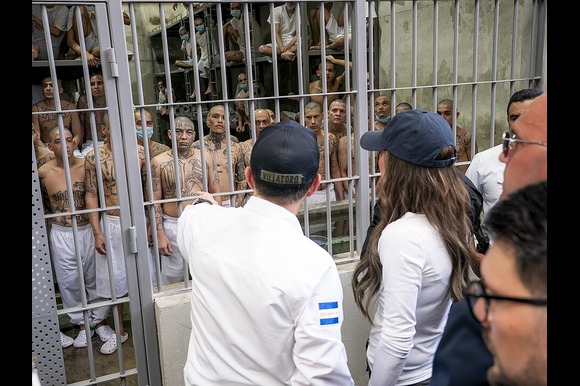The United States Supreme Court has instructed the Trump administration to halt the deportation of a group of individuals suspected of being Venezuelan gang members.
These men are currently detained in northern Texas under an 18th-Century wartime statute, and a civil liberties organization has filed a lawsuit against the government, claiming that they have not been afforded the opportunity to contest their cases in court.
Donald Trump has transferred accused Venezuelan gang members to a notorious mega-jail in El Salvador, citing the 1798 Alien Enemies Act, which grants the president the authority to order the detention and deportation of individuals from “enemy” nations without following standard legal procedures.
Historically, this act has been invoked only three times, all during wartime, with the last instance occurring during World War II when individuals of Japanese descent were detained without trial and many were sent to internment camps.
Since assuming office in January, Trump’s stringent immigration policies have faced several legal challenges.
Trump has accused the Venezuelan gang Tren de Aragua of “perpetrating, attempting, and threatening an invasion or predatory incursion” into U.S. territory.
As of April 8, out of 261 Venezuelans deported to El Salvador, 137 were removed under the Alien Enemies Act, according to a senior administration official speaking to CBS News, the BBC’s U.S. news partner.
On March 15, a lower court temporarily halted these deportations. The Supreme Court initially ruled on April 8 that Trump could utilize the Alien Enemies Act to deport alleged gang members, but emphasized that deportees must be allowed to contest their removal.
The lawsuit that led to the Supreme Court’s order on Saturday indicated that the Venezuelans detained in northern Texas received notices regarding their impending deportation in English, even though one detainee only spoke Spanish.
The American Civil Liberties Union (ACLU) raised concerns, stating that the individuals involved were not informed of their right to challenge the decision in court.
The lawsuit emphasized, “Without this Court’s intervention, numerous proposed class members could face removal to El Salvador, potentially resulting in a life sentence, without a genuine opportunity to contest their designation or removal.”
On Saturday, Supreme Court Justices Clarence Thomas and Samuel Alito expressed their dissent.
In his second inaugural address in January, President Trump vowed to “eradicate the presence of all foreign gangs and criminal networks that are inflicting severe crime on US soil.”
In a notable case, the government acknowledged that it had erroneously deported Kilmar Ábrego García, a national of El Salvador, while asserting that he is affiliated with the MS-13 gang, a claim that his lawyer and family dispute. Mr. Ábrego García has no prior criminal convictions.
The Supreme Court ruled unanimously that the government must assist in the return of Mr. Ábrego García; however, the Trump administration has stated that he will “never” be allowed to reside in the US again.
Senator Chris Van Hollen, a Democrat from Maryland, visited Mr. Ábrego García in El Salvador and reported that he had been transferred from the mega-jail Cecot (Terrorism Confinement Centre) to a different prison facility.






